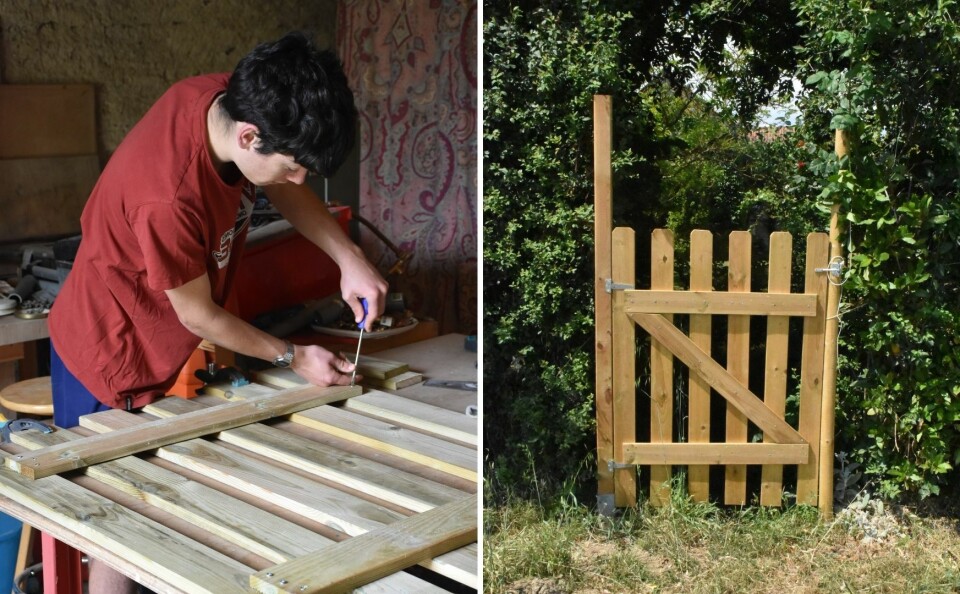-
Letters: The reality of finding a new doctor or dentist in France
Finding a replacement is nigh impossible, says Connexion reader in Lot-et-Garonne
-
The magic of mayonnaise: Why a homemade emulsion always woos guests in France
Plus, which shop-bought mayo brand is best?
-
Letters: Beware the financial cost of losing a spouse in France
Connexion reader faced unexpected expenses and legal hurdles after their partner's death, which added stress to an already difficult time
French renovation: family DIY project saves money on garden gates
When shop-bought gates were too expensive, Nick Inman got the whole family involved in his latest woodwork creations

For a good 10 years, I had been growing a wild hedge down the bottom of the garden.
I left three holes in it so that I could use the field beyond to hop in and out of the garden quite easily.
But then, in spring, my wife informed me the gaps were ugly and an invitation to strangers and stray dogs to invade our privacy.
Anyone walking across the field could see what we were doing at any time.
My son finally persuaded me to go out and get three garden gates.
Ready-made gates were expensive
You can buy them ready-made in Douglas fir for about €45. That works out at €135 just for the opening and closing parts. I would also need posts to hang the gates from, hinges, and a fastening mechanism for each.
The whole job was in danger of adding up to more than I could afford.
Read more: DIY - Check the price of cement in France and bag a better deal
Unfortunately, but fortunately, gates were out of stock in our local shop and this forced me to execute Plan B: DIM (Do It Myself).
There is nothing much simpler than a garden gate: six upright planks, two horizontal and one diagonal. Why pay €45 for some flimsy mass-produced thing that I could make myself?
I decided to use the ready-made article as a model, improve on it, and save a bit of money in the process.
Choosing timber and hinges
I spent some time humming and hawing about the exact type of timber to use but eventually struck lucky. I found some 2.4m decking planks, 19mm thick – sturdy enough to walk on and treated against the elements – on promotion.
They were much heavier than the timber used in the off-the-shelf gates, which was a good thing, but you have to be careful the gates are not too heavy or you have to buy bigger hinges, and up goes the cost.
I also bought posts and metal post sockets (part of the same promotion), some T-hinges (charnières en T) and a large box of 3.5cm screws.
I could have nailed the gates together but the saving did not seem worth it.
Wife and son improved the design
We set up a production line in my workshop.
I made the first gate, cutting the planks in half for the uprights, spacing them evenly to a width of 90cm (wide enough for a wheelbarrow) and fixing them in place with the horizontal members (80cm) and finally the diagonal piece (angled at each end to fit).
My wife and son improved on the design and made the second two.
They suggested cutting off the corners of the uprights at the top to make the gate more attractive: an easy modification to do.
Daughter brought latches from UK
To fit the gates, I dug holes and filled them with concrete to hold the metal post sockets (supports poteaux) firmly.
The finishing touch was a self-locking latch.
These are available in France but not everywhere (they are called serrure automatique porte), but they are much cheaper in the UK.
I bought some online and got my daughter to deliver (and fit) them when she visited.
Family project saved money
The finished products are stronger and better-looking than anything we saw while out shopping. They look like they have always been there.
And the cost?
All in, €113.04 to make and fit three gates – cheaper than buying the gates alone.
Sometimes it really does pay to do it yourself or, in this case, as a family team. And the result is all the more satisfying.
Related articles
French DIY: My mission to build a cost-effective garden pergola
French farmhouse renovation: Installing a gable window
French farmhouse renovation: How to increase space in an old house
























